#Portugal's political situation
Explore tagged Tumblr posts
Text
I'm scared. So fucking terrified that I can't express it right.
I'm from Portugal. Our government was dissolved by the president recently because our Prime Minister of the last 8 years resigned after his name was brought up in a criminal affair regarding very high patent government members. You might have heard of it if you follow international news. If you do, you probably know more about it than me, but this is the issue in a nutshell.
In the last elections, the Prime Minister's party had the "absolute majority" in Parliament (I don't know the name in English, that's how it's called in Portuguese), which basically means that more than half of the government's members belonged to that particular party, meaning they could pass whatever laws they wanted if they all voted the same. This meant that, for the first time in forever, real change could have happened for the better here if they had done that, since they call themselves a "center-left" party.
The problem is that some major problems happened during this government's time in power, as well as some others that had little to change happening to them. People are frustrated. Everyone is. Everyone was already tired of that party being in power during the last elections, but because there was the threat of the rising far-right parties, people got scared and mainly voted for the same party, afraid that we'd have another far-right government, not even 50 years after we freed ourselves from a fascist dictatorship. So he and his party got the absolute majority in parliament. And things got worse.
Yes, it is time for another party to be in power, but the far-right is NOT the answer, and that's what many people, and alarmingly, many young, about-to-vote-for-the-first-time impressionable people, are failing to understand.
The far-right claims to be a people's party, they claim they defend the people's interests, but THEY DON'T. They're racist, xenophobic, misogynistic, queerphobic in general, they're pro-marginalizing already marginalized communities. Did I already mention they plan to end universal healthcare, public education and social services? Well, they do.
The problem is that many people who are advocating for that party right now, when the new elections are a month from tomorrow, will absolutely lose rights if they get to power.
But they don't listen. They just think that, because a leftist party messed up (and they did mess up pretty badly, don't get me wrong. I'm in the left but I can recognize that), that the far-right is the solution to everyone's problems, when they will only make them worse.
I think of myself, a transgender man, who will absolutely lose my rights to transition as I wish if the far-right gets to power.
I think of my little sister, who is about to celebrate one month dating her girlfriend and who will not be able to get married to her if she wishes to do so if the far-right gets to power.
I think of my grandmother, who was recently very sick and would not have survived if Portugal didn't have universal healthcare, who have died otherwise because the family would not have been able to pay for her treatments in the privatized healthcare the far-right idealizes.
I think of all the immigrant friends I've made over the years and how they would all be deported to their countries of origin if the far-right got to power.
I think of every child, myself included, who would not have gotten even the most basic of education if there weren't public schools in my country.
I think of the scholarship I got to study at university because my family is low-income, which I would definitely not have received if the far-right was in power.
If you're from Portugal and are old enough to vote, please do so with conscience. Lives will depend on your vote on March 10th. Lives will be sacrificed for an illusion of freedom that will immediately disappear or lives will be spared. Please, vote, but don't vote for a party that would take away the rights of more than half of the population. Even if it seems like those measures wouldn't affect you, they definitely would. We're all in the same boat. Some of us won't even get on the boat if my concerns turn out to be true. The majority of us will drown.
4 notes
·
View notes
Text
The Age of Louis XIV

Voltaire, who wrote Le sciècle de Louis XIV (The Age of Louis XIV), started off by doing a recount of the states of Europe before Louis XIV. and my hetalia brain rot began to go wild so i figure this can help me understand the first chapter of the book better so I sorted out quotes and made a brief summary for each mentioned nation in order that is written in the book to help enforce my understanding.
Germany*
*- "Germany" refers to the Empire of Germany, known in history as the Holy Roman Empire; since the 15th century, its throne had been occupied by the Habsburgs

"...the most powerful neighbor which France has...it abounds more with sturdy men inured to labor." "this great Germanic body...is maintained in [... ] order and regularity [...] The difference of government and genius makes...the Germans [more proper] for acting on the defensive."
Summary: strong, divided into two parties by Christianity. Emperor has less power in compare to a King in France. Was at the time pretty poor despite being "rich at home", and would eventually see its flourishing later on.
Spain
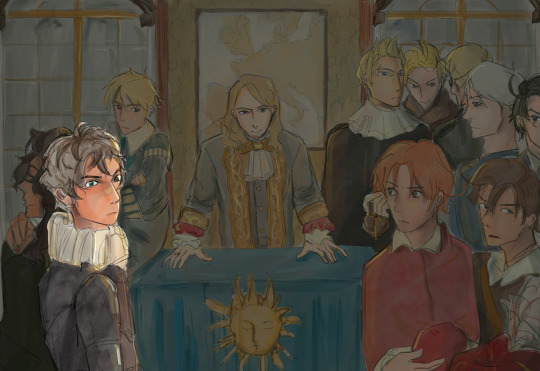
"...more formidable to Europe than the Germanic Empire. The kings of Spain were infinitely more absolute and rich than emperors..." "[Spain] under Philip II became a vast body without substance, which had more reputation than real strength...Notwithstanding all these disadvantages, Spain, by being united to the empire, threw a very formidable weight into the balance of Europe."
Summary: strong #2, starting to see its weak points, but still a ringing force and surviving well with the colonies.
Portugal
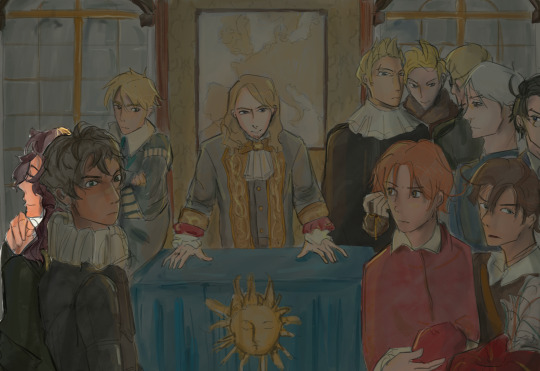
"...Portugal was again made a kingdom...through necessity, cultivated trades...entered into a league with the French and Dutch against Spain." "Portugal...extended its trade, and augmented its power..."
Summary: doing well over there. Shall watch your career with great interest.
The United Provinces
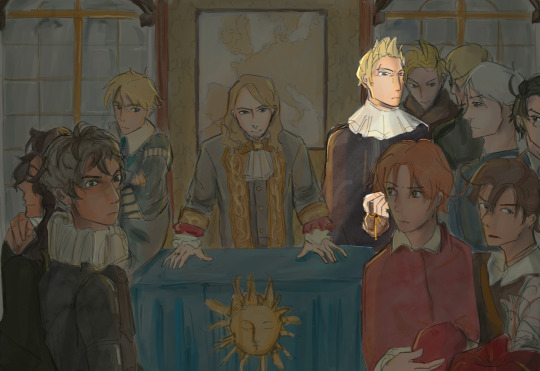
"...almost the only example in the world of what may be done by the love of liberty and unwearied labor. There poor people...made head against the whole collected force of their master and tyrant...and founded a power which we have seen counterbalancing that of Spain itself." "...they established a form of government which preserves...equality, the most natural right of human kind."
Summary: quite an admirable force (don't mess with the Dutch's money bags™️). Good government.
England
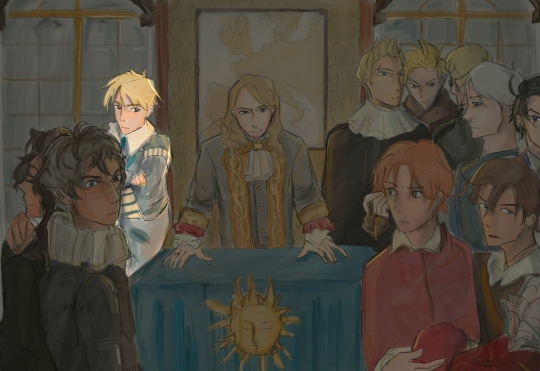
"England...arrogated to itself the sovereignty of the seas, and pretended to preserve a balance between the powers of Europe." "This civil war...[made England] lost [...] credit in Europe...trade was obstructed, and other nations looked upon [England]...till the time that she at once became more formidable than ever, under the rule of Cromwell."
Summary: pirate arc of England sprouting. Charles I could do well in anything but being a king ("ill-advised prince"). Waiting for Cromwell to do his thing.
Rome/The rest of Italy
I merged these two parts together for ✨aesthetics✨
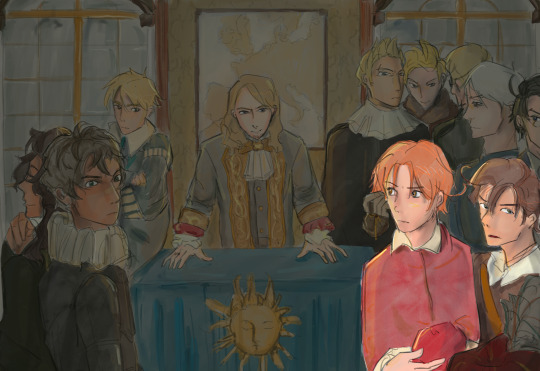
"[Rome] has very little trade or money. [Rome's] spiritual authority...is slighted and abhorred by one half of Christendom...yet [...] some [...] resist [Rome's] will at times with reason and success." "but [the privileges] of Rome, by an almost constant proper use of resolution and concession, has preserved all that was humanly possible for her to preserve." "Some rights, many pretensions, patience and politics are all that Rome has left now of that ancient power..."
Summary: typical pope behavior, but in reality was losing respect and control. Impressively that was dealt with seasoned insight, and different oppositions of different kings/emperors were met with different levels of defense ("submissive...terrible to..acting cunningly"). Sly old fox, if you will.
"...situated in a peaceble country...biassed by various interests." "The state of Florence enjoyed tranquility and abundance under [...] Medici; and literature, arts, and politeness [...] still flourished there."
Summary: the typical Renaissance still doing the thing. Less disturbed by conflicts compared to the northern parts.
The Northern Kingdoms
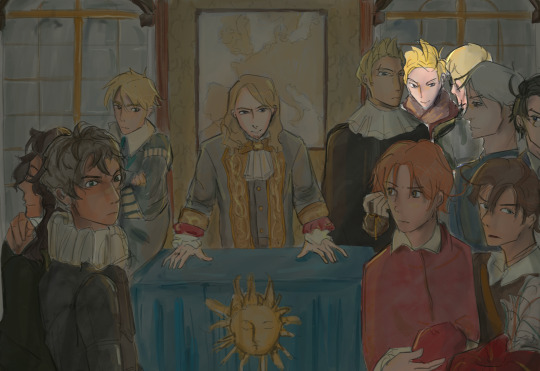
"The Swedes [...] were a freer nation by their constitution which admits even the lowest class of the people into the assembly of the general estates." "Denmark...was no longer so [formidable] to any power."
Summary: Sweden good. Denmark flopping a bit. The rest of the northern kingdoms were doing their best (fighting)
The Turks

"The seraglio, though corrupted by effeminacy, still retained its cruelty...when it had [recovered from wars], this empire became again formidable."
Summary: may look messy back home but still don't underestimate the power
The situation of France

"France [...] was in alliance with Sweden, Holland, Savoy and Portugal...was engaged in a war against the empire of Spain...The French there has done the Spaniards and Germans a great deal of mischief, and had suffered as much themselves."
Summary: fighting with Spain (and also the house of Austria, so also Germany), tho the battles has reduced to petty squabbles over "a few frontier towns". Richelieu came to raise tax.
---
Works cited The Works of Voltaire. A Contemporary Version. A Critique and Biography by John Morley, notes by Tobias Smollett, trans. William F. Fleming (New York: E.R. DuMont, 1901). In 21 vols. Vol. XII.
--- Rambling (just a little) time.
Okay first off, bear in mind that all the quotes and summarized content are from the pov of Voltaire, so there can be possible biases.
I've been invested in the reign of Louis XIV for quite a while now, and I can attribute the reasons to 1) BBC Versailles, 2) Molière, and 3) general liking to history at the time (17-18c). I'm trying to figure out what exactly that the time period attracted me so much, like what "vibe" what "ideal" etc, but I'm still trying. And reading that book, which is long as hell, not to mention the messy af™️ European drama and people having Too Similar Names may just be helpful in terms of getting to know the history that happened in and around the court of Louis XIV.
Welp, gotta read more if I want to know more.
#hetalia#aph#historical hetalia#i will be lazy and not tag everyone sorry not sorry#doodle dump#random otter rattles#history
174 notes
·
View notes
Text
Madeira, Portugal: Madeira is an autonomous region of Portugal. It is an archipelago situated in the North Atlantic Ocean, in the region of Macaronesia, just under 400 kilometres north of the Canary Islands, 520 kilometres west of the Kingdom of Morocco and 805 kilometres southwest of mainland Portugal. Madeira sits on the African Tectonic Plate, although it is culturally, politically and ethnically associated with Europe, with its population predominantly descended from Portuguese settlers. The capital of Madeira is Funchal, on the main island’s south coast. Wikipedia
292 notes
·
View notes
Text
Like I really do wish people remembered more about the Anti-Imperial struggles of Southern Africa in the late 20th century. As incomplete as their revolutions may have been, with the politically free nations succumbing to the overwhelming force of Western Imperialism and being taken over by neo-colonial comprador regimes, what they did manage to achieve was still so very impressive. A struggle for human dignity against the most openly cruel and brutish forms of colonialism, the mobilisation and education of the most impoverished and super-exploited people on the planet in the name of not only liberating their own people but with the understanding that they were advancing the interests of humanity as a whole. Nationalist in character and internationalist in spirit, seeking to build independent nations that could co-operate in solidarity with all the progressive minded peoples of the world. Introducing healthcare, education and fair exchange into the forgotten and exploited parts of their country, giving a purpose to millions who enthusiastically gave their lives to defend and advance their gains both material and psychological.
The MPLA in Angola, FRELIMO in Mozambique, the alliance of ZANU and ZAPU in Zimbabwe, SWAPO in Namibia and the ANC of South Africa. It's also worth remembering the PAIGC of Guinea-Bissau and Cape Verde who, despite their geographical separation, faced a common enemy and so forged deep bonds with their comrades to the south. Whatever their eventual fates after independence, triumphs and failures alike, the struggles they fought against the reactionary White Supremacist regimes of Portugal, Rhodesia and South Africa were nothing short of heroic. Despite vast differences in space and time, I think these struggles hold both inspiration and lessons for progressives peoples all over the world to this day. It's truly a great shame how much they've been forgotten, these conflicts only ever brought up as a footnote to something more well known rather than as an area of interest in their own right.
If you're curious, the Africa section of the Marxist Internet Archive has a lot of good material from the period that's a good place to start learning more, even if it is rather lacking in information from the latter portion of the struggle. ARG's Race to Power gives a good overview of the general situation in Southern Africa as of 1971, while LSM has some good general collection of material collected from Angola, Mozambique and Guinea-Bissau. The entire LSM "Life Histories from Revolution" series provides some really interesting first hand ground-level accounts of the conditions of life under Imperialism and the movements that formed to oppose it, while their Interviews with Liberation Movement Leaders provides the views of people higher up in the revolutionary movements. I'd recommend checking them out to at least broadly familiarise yourself with these tragically neglected struggles.
370 notes
·
View notes
Text
I was thinking...
For My Hero Academia, having an international Pro-Hero license is probably super common in Europe, Africa, South America, basically continents that have a lot of countries grouped together.
It's understandable why this issue wouldn't really be explored in canon because Japan is an island nation that doesn't share a land border with anyone else.
But I find it hard to believe that there'd be a situation unfolding just over the border in, say Portugal, and the Spanish Pro-Heroes aren't going to rush over and help out their Portuguese counterparts because: "Sorry, there's an imaginary political line we can't cross without a lot of red tape." Like, are they just going to stand by while a villain rampages? And what happens when some French villain flees a pursuing hero into Germany? Are they just gonna "Neener, neener," two feet over the border, flip them the bird, and book it before the German Pros arrive on scene? No, somebody with Deku levels of 'I gotta help these people!' probably crossed a border they weren't supposed to cross, got in trouble for it, there was a controversy over them getting in trouble over it, politicians argued about it for five+ years, and then an international system was put in place.
So yeah, a European Pro applying for multiple licenses to practice in at least neighboring countries would make a lot of sense. There's probably a few closed off countries that are sticklers about their rules, but otherwise crossover would have to be inevitable.
335 notes
·
View notes
Text

Make Love not War
Historical Peace Movements and the Ongoing Relevance of War and Peace Since antiquity, philosophers and state leaders have grappled with the concepts of war and peace. Early on, thinkers like Plato and Aristotle recognized the destruction that wars can bring and advocated for peace as the ideal state for humanity. In the Middle Ages, the Church played a significant role in promoting ideas of peace, including through the 'Peace of God movement', which aimed to minimize wars among Christians.
The modern era saw the emergence of organized peace movements, particularly in the 19th century, when societies such as the American Peace Society and the British Peace Society were founded. These organizations advocated for the peaceful resolution of international disputes and laid the groundwork for later international cooperation to prevent conflicts.
The 1960s: A Turning Point The 1960s marked a high point of peace movements, driven by the shadow of the Cold War and the fear of nuclear annihilation. In the UK, this led to the founding of the Campaign for Nuclear Disarmament (CND) in 1958, whose peace symbol became a global sign of resistance against war. In the USA, the Vietnam War mobilized wide sections of the population, especially young people and students, who through organizations like Students for a Democratic Society (SDS) and others, initiated massive protests and demonstrations against the war.
The Carnation Revolution: A Peaceful Overturn A prominent example of a successful and predominantly peaceful revolution is the Portuguese Carnation Revolution of 1974. This revolution not only ended nearly five decades of dictatorship in Portugal but also inspired movements worldwide that saw changes could be achieved through nonviolent means. The soldiers who carried carnations in their gun barrels became a lasting symbol of peaceful change and demonstrated that the military can play a constructive role in promoting democracy and human rights.
Current Situation: War and Peace in the 21st Century Today, at a time when conflicts are increasing in many parts of the world, the issue of war and peace remains of crucial importance. Regional conflicts, the risk of escalation of violence, and the humanitarian crises caused by wars call on us to learn from history and strengthen active peace efforts. The lessons from movements like the Carnation Revolution and the protests of the 1960s show that societal and international pressure can be crucial in bringing about political changes and securing peace in the long term.
Base image generated with DALL-E, overworked with SD-1.5/SDXL inpainting, manual editing and composing.
#HistoricalPeaceMovements#WarAndPeace#makeLoveNotWar#stopWar#CarnationRevolution#gayart#loveSoldier#peace#gaycomic
70 notes
·
View notes
Note
Okay but why do François and Arthur keep separating if they are the only ones who understand each other that well? It's their arrogant personality? Their vicious habits and need to be correct? Bc I actually see françois more aggressive and Arthur more permissive in the end which seems to be contradictory to what I see people writing in the fruk shippers. I don't get it, no hate
Nah nah all good valid question and i do agree actually on most of what you say.
They dont separate in the traditional and common way we associate humans and human relationships with. Not fully.
Lets say they spend a vacation together. They go to the beach and drink and find bars and terorrize supermarkets during their stay. They are happy and content and a destrucrive power couple. But they are still nations and nations have more responsibilities than two moddle aged human men could ever have. So they clash on a thing or two. One takes a stab at an old phychologial wound thought healed. The other gets irritated but doesnt express it (cus emotional repression is legal apparently) and he takes a jab at the other at their weak spot. And they are irritated at each other and start to bicker bc both are too hardheaded to apologize or talk like people who didnt grow up during the middle ages. Now any small mishap irritates the other. A big fight then separation. They dont see eath other for a longer period of time after that. They might hit it off again with an old friend/enemy/lover and its fine. The problem is that François knows exactly what to say and what nerve to pick and get on it to get Arthur to react as he wants. And Arthur is too much of a sarcastic person and generally a man who enjoys a good challege which he might not get from everyone he interacts with. At least not precisely the way he likes. Like Alfred, Arthur gets bored seemingly quickly with a person. Also his affection can be missinterpreted as belittlement or even a jibe or taunt. He portrays himself as polite and appropriate but in truth he is a hard man to get along with. And few people know how to deal and distinguish his comments.
So after a randevouz with Portugal whom he hasnt seen in a while, he is once again sitting at home by himself pondering what takeout to get bc who has time to cook these days. He is still annoyed with francois but doesnt think too much of it. So after a while something happens and he wants to talk to someone about it, so having all but forgotten their little feud he picks up the phone and dials the french phone number. François picks up and you can hear the irritation in the "I thought the lord is still pissed at me. What a surprise." To which Arthur responds with "Oh do shut up. Now listen I've recetly got word that......" because who can be as stubborn as mules yet forgetful as fish at the same time? These two.
I do think to a certain degree Arthur is more permissive. Especially as he got older and saw his empire sink into that ocean he loved so much. François has more of a need to prove that he is still on top of the game so he does tend to be more assertive in some situations and discussions.
Even if they dont speak to eachother for multiple years at a time, something will come that hauls them back to one another. Be it shared history, mutual understanding or good gossip.
In short, small things break them apart and smaller things bring them together.
#i miss them holy fuck#i need a holywood movie set in the 1880s in the english countryside and they are sitting at the breakfast table eating and insulting#eachother as they pass bread and wine and butter to oneanother#i need them stressed and on a time crunch trying to figure out a plan durong wartime#i need them say last words to eachother as they both die but have the last words be somthing like we should have stayed home today#hetalia#ask meli#hws england#hws france#fruk#my headcanons#im sorry if it doesnt answer ur ask but i did enjoy your point of view very much anon
60 notes
·
View notes
Text
i really really wanted to go abroad for my masters but my main options were like. france, germany, uk, netherlands. all of which are getting increasingly fascist. the netherlands isnt as bad afaik but its not amazing either. the political situation in portugal isnt great but at least its a mess im familiar with and know how to navigate
10 notes
·
View notes
Note
i once read somewhere that one of the reasons why portugal won't recognize palestine is because of the "catholic guilt" regarding the way jews were treated in portugal. do you think this is true?
Possibly. I genuinely don't know. I think the average portuguese person doesn't even know enough history of jewish ppl in this country to even understand why there's a level of guilt to begin with (just today I saw a video of a lady from Morocco and a portuguese lady comparing words thay sounded identical and the comments were portuguese assholes saying because we kind of were in Morocco they stole the words from us, like the al-Andalus was a fever dream I guess).
I genuinely also believe there is political interest behind, although I also don't know enough about it to discuss it, which ties perfectly into Portuguese people's general inability to see the gray area of any topic whatsoever.
But I don't think the majority of Portuguese people are against Palestine. Lisbon is loaded with free palestine messages and I don't know a single person who is pro israel. I know of guides in finicky situations bc the clients were israeli and tried to start shit bc of something they saw written on the walls. Most of us just try to avoid the conversation cause well we gotta do our jobs
On a governmental level however is a different conversation.
I just find it so hard to simply accept it's "catholic guilt" when this country is made of people who genuinely want to claim Cristopher Columbus for ourselves but you never know
26 notes
·
View notes
Text
instagram
I cannot even put to words how scary the situation is getting, not only in Portugal, but in Europe in general.
The world is being consumed by the far-right, and if we don't stop this the next change we get, i am afraid things will go bad for this generation and generations to come, not only on a social level, but on an economic and environmental as well.
And it is honestly so fucking sad to see this happen to my country on the 50th birthday of the democracy, on the year we were supposed to celebrate the fall of the fascist regime of Salazar on the 25th of April of 1974, and instead we get 50 fascist deputies on Chega's behalf, one for each year we lived free since then, as the biggest fuck you on portuguese history...
...And to think of all the left wing people who put their lives at risk then, some of which are my teachers and my family, alive to this day, who are witnessing this downwards spiral back into what they tried so hard to get out of, it is so. Fucking. Sad.
I like to pretend like i don't care about politics on a day to day basis, but i can't deny that this made me fucking lose a lot of hope. I just want to know what the people like Mario Soares and others, who have sadly already died, who gave freedom to this country, would think about it's current state.
#chega#portugal#politics#far right#fascism#i need to let my frustrations out i hate that stupid little evil bitch and his incessant spread of hate#towards the poor the gay the poc the imigrants and everyone and anyone who is not like him or a neo nazi#Instagram
32 notes
·
View notes
Note
Hi! I’m Sephardic, specifically the kind that was from Portugal and then went to Amsterdam around 1493. I went through your blog but didn’t see anything from this community specifically. Do you have any photos of them? I have one thing from that side of the family, a small gold hamsa with a tiny green emerald in the middle from my grandmother and it was her grandmother’s. But would love to learn more. Thanks so much for all you do!
In the late 15th century, Spain and Portugal expelled their large Jewish population and many Jews found refuge in the Balkans and North Africa. However, as the political situation across Europe shifted, new opportunities for Jewish settlement materialized, particularly Holland, which emerged from the 80 year Wars of Spanish Succession as an independent nation in 1648.
Article XIII of the Treaty of Utrecht, which ratified the union of the northern provinces, declared that no one was to be prosecuted for his religious beliefs. This clause provided the legal basis upon which Jews immediately began to take up residence and seek recognition in Holland. In 1604 a certain Manuel Rodrigues de Vega petitioned the city’s burgomasters to be allowed to establish silk mills there along with two other Portuguese Jews. Eventually, Sephardic poets, dramatists, calligraphers and copper-etchers would also be found alongside the customary merchants, bankers, and physicians.
Many Dutch intellectuals became fascinated with the somewhat exotic inhabitants of the Jewish quarter and sought them out for conversation. Conversely, the Sephardic Jews reaped the benefits of the lively intellectual life created by Amsterdam’s savants, who eagerly cultivated theology, philosophy, jurisprudence, mathematics and oriental languages.
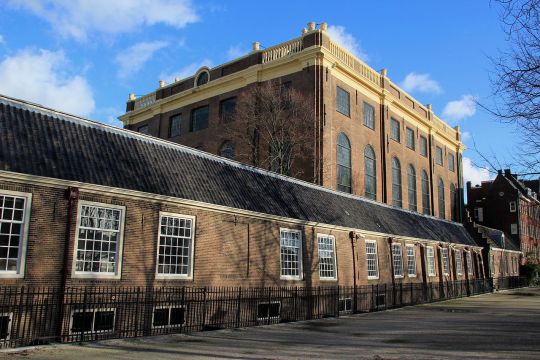
This is a photo of the old Portuguese synagogue in Amsterdam.
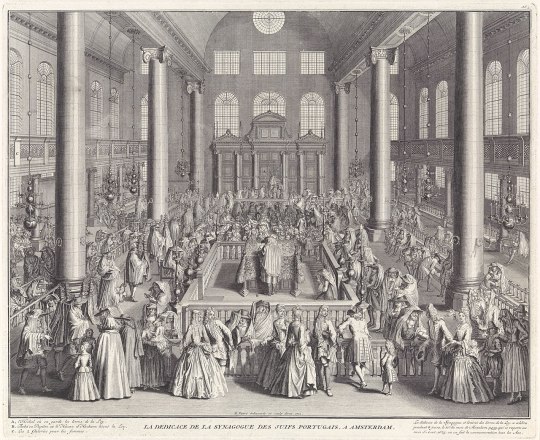
This lithograph by Bernard Picart shows its inauguration in 1675.
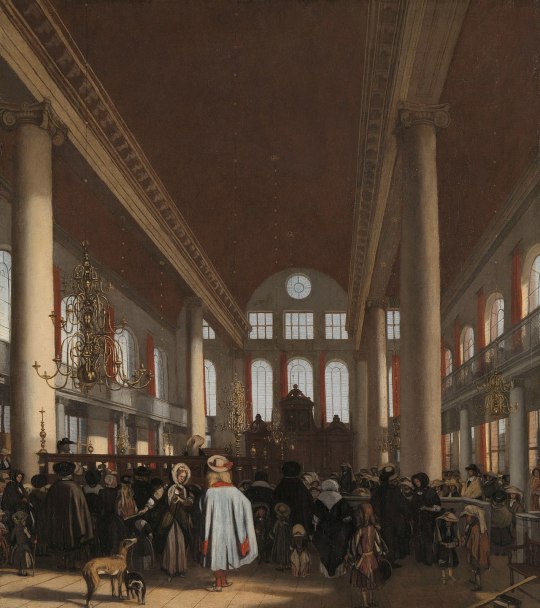
The painting of Emanuel de Witte depicts the interior of the synagogue in 1680. The Amsterdam Sephardic community was one of the largest and richest Jewish communities in Europe during the Dutch Golden Age, and their very large synagogue reflected this. The synagogue remains an active place of worship and is also a popular tourist attraction.
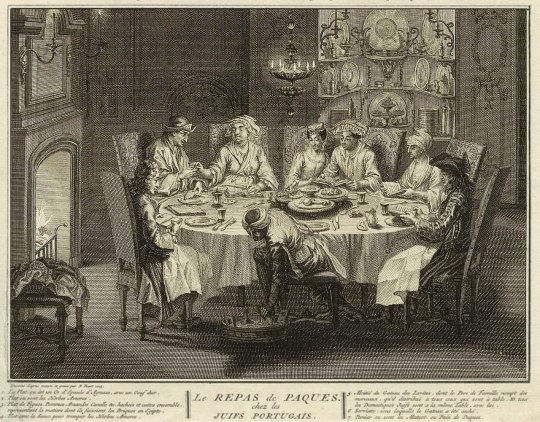
This is, again by Picart, a depiction of the Passover Seder of the Portuguese Jews of Amsterdam.
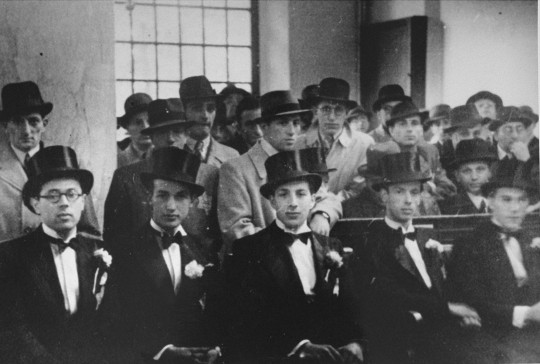
These are male attendants at a Sephardic wedding in Amsterdam in 1942, shortly before the German occupiers murdered most of the community.
72 notes
·
View notes
Text
today is yesterday was the international mother language day, so i thought i could make a post about the languages spoken in spain!
all of this data will come out of wikipedia, so i'm sorry if there's something wrong. i now realise i could've planned this way more, it's my bad honestly, i'm sorry.
anyways, let's start with the mother tongue map of spain; each color represents one language:
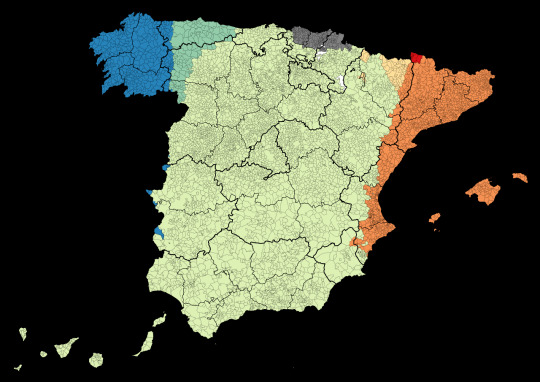
light green: spanish, galician: blue, catalan: orange, euskera: grey, aranese: red, asturleonese: green, aragonese: yellow.
the blue dots in extremadura are fala (then northernmost one), and most likely portuguese like the one spoken in olivença (thanks @satyrwaluigi).
by comparision, here's a map with the recognized co-oficial languages (spanish is the national language, and in various regions some languages have a co-oficial status)
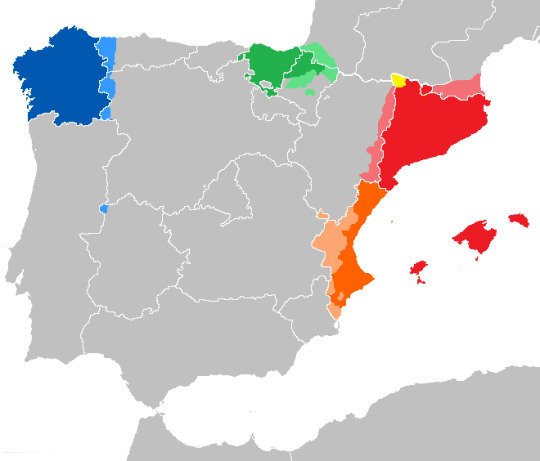
the lighter colours refer to different categories depending of the language:
lighter blue refers to areas where galician is recognized as a minoritized language but isn't co-oficial
lighter green refers to areas where euskera is recognized as a minoritized language but isn't co-oficial
lighter red refers to areas where catalan is spoken but isn't co-oficial
lighter orange refers to areas where valencian is the official language but isn't spoken.
the reasoning behind the separating catalan and valencian into two distinct languages is a complex one, if you want more info @useless-catalanfacts made a great post about it (and here is even more info about the topic they very nicely provided me with). in a nutshell, valencian is not a distinct language from catalan and the reason why it's listed as such is political.
as you can see, there are some languages, mainly aragonese and asturleonese, that aren't recognized as co-oficial languages in their respective regions despite the large number of speakers. this makes them especially vulnerable to linguistic colonialism, and is why thousands of peoples from those areas are fighting in order to make their languages official in the state's eyes. if someone knows of organizations or groups that are involved in this movement, please let me know and i'll add them to the post.
apart from the aforementioned catalan blog, here in tumblr there's really great blogs about iberian minoritized languages; i personally recommend @beautiful-basque-country and @minglana for euskera and aragonese respectively, but i am sure there's more.
also, there are some languages that are not even mentioned in the maps despite its critical situation that i thought i should remark here:
fala, as stated before, is spoken in the borders between portugal and extremadura and it heavily borrows from portuguese. it has an estimated 11k native speakers.
caló is the language of the iberian roma people. it has an estimated 60k native speakers between spain and portugal.
darija, the arabic variant native to morocco, is also spoken in ceuta, a city of 80k inhabitants.
tarifit / riffian, a tamazight variant spoken in the rif area of northern africa, including the city of melilla, with 86k inhabitants.
finally, apart from the autochtonous languages, there are also several languages brought by the migrant population, who should also be counted in this post. here are all the languages spoken in spain; the first number is of native speakers, the second one of non-native speakers, and the third one is the total:

the languages translated into english are: spanish, catalan / valencian, galician, arabic, romanian, euskera, english, german, portuguese, asturleonese, italian, bulgarian, wu chinese, french, spanish sign language, aragonese, caló, catalan sign language, basque sign language, riffian, aranese, fala.
#spain#iberia#languages#spanishmaravillas#i'm no longer gonna use typicalspanish cause there's a blog with that name that i may or may not be involved with#so i'll tag my posts with spanishmaravillas from now on
112 notes
·
View notes
Note
Hello! Centuries after Jewish people were expelled from Portugal and Spain, Portugal allowed them to return, but I don't know if Spain did the same. I read your post about Jews in Catalonia, and was wondering if some came back and if there is still a Jewish comunity there today? :o
Yes, the same happened, but they are still few in number.
Some Jewish people returned to Iberia in the 20th century. It might come as a surprise to many, but it was during the proto-fascist dictatorship of Primo de Rivera and during the fascist dictatorship of Francisco Franco when more Jewish people moved to Spain.
Philosephardism became popular in the early 1900s. That's when the first campaigns to bring Sephardi people close to Spain started, many of them led by the politician Ángel Pulido Fernández.
The first campaign was in 1904, but it was more about creating shared organizations with Sephardis in Northern Africa and not so much migration yet. In 1910, the King of Spain Alfonso XIII founded the Spanish-Hebrew Union (Unión Hispano-Hebrea), which saw 4000 people sign up as members in the Moroccan protectorate (remember that at this time Morocco was a protectorate of Spain). This Union created schools for Sephardi children in Morocco and the Balkans to teach them Spanish.
The moment where many Jewish people migrated to Spain, creating a significant Jewish community for the first time since the Middle Ages, was during the First World War (Spain was neutral in WW1, so it was a safe area compared to most of Europe). Barcelona was one of the places that received the most Jewish immigration in this period: about 1,000 people, most of them coming from Austria-Hungary and some from France.
More continued to migrate to Spain during the Primo de Rivera dictatorship (1923-1930), because in 1924 the dictatorship made a law that all Sephardi people could get the Spanish nationality. According to the Comunitat Israelita de Barcelona (the association of Jewish people of Barcelona), in 1936 there were already 5,000 Jewish people, more than half of them newly arrived from Poland and Germany, and others having arrived from Austria, Hungary and Romania.
As expected, the immigration continued during the Second World War, escaping the Holocaust (even though Spain gave support to the Nazis and sent some legions to fight against Russia on Germany's side, it was mostly neutral in WW2 because the Spanish Civil War had just ended, leaving the country in extreme poverty and destruction). The regime said that they were only allowing the Jewish people to cross Spain on their way to somewhere else and that they didn't want them to stay, but after all they weren't really checking on each person, so some stayed.
Even with this situation, make no mistake: Jewish people were not well seen during the dictatorships. It was mandatory to be Catholic, and everything bad in the world was attributed either to the "separatist reds" (national minorities, independentists, communists, anarchists, anticlericals, atheists) or to a "Judeo-Masonic conspiracy" (Jewish people and Freemasons), thought to be working together to destroy Spain and the Christendom. This wasn't just a matter of the early years, no: it was a constant reasoning during the whole dictatorship in the schools, media, speeches, everything. Even in Franco's very last public appearance (October 1st 1975, celebrating his 39th anniversary since he was "appointed" as dictator, when the last week there had been demonstrations in different places around Europe against the death sentence that the regime had condemned some political dissidents to), he blamed the eternal communist, Freemason, Jewish international conspiracy for those demonstrations.
Despite their antisemitism, after the Second World War the fascist dictatorship of Spain also used the fact that they were "helping" Jewish people as a propaganda point to get the sympathy of Western countries, as a way to show that they had sided with Hitler and Mussolini because of a common hatred of communism but not because they hate Jewish people. This way, the dictatorship hoped to be accepted as a normal country, join the UN, with no sanctions. And it worked, mostly because the USA was promoting fascist countries as a way to counter communism.
In the late 1940s, the dictatorship allowed private individual worship to any religion (you could pray to whoever in your private home), even though everyone still had to take part in the Catholic rites in public. In 1949, Franco officially recognised the Barcelona Israelite Community, who opened a synagogue in Barcelona in the year 1954. This was the first synagogue in all the state of Spain since the Jewish people were expelled or forced to convert in 1492.
In the 1950s, the biggest Jewish immigration wave to Spain arrives from Northern Africa, and in the 1960s from South America. In 1968, the Vatican and Spain symbolically revoked the 1492 decree of expulsion. After the end of the dictatorship (1977), there is freedom of religion in Spain.
Nowadays, there is a small but existing Jewish community resulting of these waves of immigration throughout the 20th century. They are only a few thousands, so it doesn't show up in any religion statistics, but they are there.

Percentage of the Spanish population that identifies with each religion. Data from Observatorio del Pluralismo Religioso de España.
#ask#història#religió#jueus catalans#religions#history#20th century history#jewish#spain#european history#history of religion#franquismo#ww1#ww2
33 notes
·
View notes
Text
Something Carlando small for a light three-minute reading.❤️🧡
(This ficlet is absolutely made up by the author)
“Do you want to do something?” Carlos asked. “On summer break?”
Lando averted his eyes from the crowd and turned to the man of the hour with furrowed eyebrows.
“Like what?” he asked him, trying really, truly hard to keep his stare off Carlos’s ridiculous bucket hat. “Golf?”
“Portugal.” Carlos said simultaneously.
The truck started moving then and Lando gripped the bar, leaning back to stretch his back. It was just the two of them on the lifted platform again but the camera hadn’t reached them yet.
“Is there a golf tournament? Perhaps Max would want to go with us-”
“No,” Carlos touched his arm to stop him for a single second and let go. “I mean you and I.” he specified.
Lando squinted at him. “Me with the Carloses again?”
“Lando-” Carlos hung his head forward, appearing a little exasperated. He moved his torso a bit and raised his eyes to him again. “I mean, you and I. Just the two of us in Portugal. Not only for golf, but sure if you want to. Vacation together. Uh, alone together.” he explained.
Lando blinked. He felt his throat turning dry and all of the sudden, he couldn’t figure out how breathing worked.
“Why?” he breathed out.
Carlos raised his hand and waved to the crowd, eliciting another chaotic outburst from the Spanish sea of people.
“Sorry,” the appointed journalist smiled at them. “I’m afraid you’re going to need to move a bit to-”
“Of course.” Carlos politely said and turned around to descend the two steps.
Lando started following him, and stopped when he did, just a few centimetres away Oscar and Logan.
“Can you repeat what you said?” he said, completely ignoring anyone and everyone. “And then answer me the ‘why’ part?”
“Do you want to go to Portugal with me this summer break?” Carlos immediately did as was said. “Because-”
“Blimey it’s hot.” George Russell interrupted Carlos’s utterance. “That hat is awful mate.” he turned to Carlos.
Lando wanted to lose it. Ney. He was ready to lose it.
“Your face is awful.” Carlos threw back making George whole-heartedly laugh at the playful jab.
Lando groaned, finding nothing funny at the situation.
“We were talking, mate.” he said through his teeth.
“You always are.” George retorted with a dismissive wave of hand.
And just like that, everything had to be put on hold. From Carlos’s suggestion to Lando’s panicky thoughts and oddly excited insights, as if he was expecting something. He had no idea why a mere suggestion of shared vacation with Carlos had turned him into a mess whatsoever. Well, he had /some/ idea.
By the first pit-stop, Lando had no hope for the race and he had been right. He automatically completed his interviews and then made an appearance in the debrief room, explaining a few times the same thing of how he had ended up 18th.
Where are you?
He fidgeted on spot, pretending to listening his father’s conversation with Zak, checking his phone five times per minute.
Hotel. the reply came fifteen minutes later.
Can we talk? Lando typed but paused. He was about to appear desperate but that was Carlos and he decided he didn’t care.
I think I’m falling asleep already cabrón.
Lando wasn’t impressed at all with the reply and after some not-so-lengthy thinking session, he decided that he was really going to ditch his friends that were about to attend some party and take a cab to the hotel near Barceloneta.
He started knocking on the door quietly, respecting the rest of the hotel guests. But it didn’t work. So respect was out of the high window. He hit the door harder and it was then that he heard shuffling from the other side-
“Lando?” Carlos opened the door, squinting at him. “How did you know my roo-”
“Caco likes me more than you.” Lando replied him and passed the threshold.
“That sounds about right.” Carlos mumbled through a yawn, stretching his arms upwards.
Lando momentarily lost his trail of thought at the sight, all bulky and dark. He literally had to shake his intrusive ideas away and clear his throat.
Carlos on the other hand, had no intention of concentrating and simply fell on the bed again, letting out a satisfied groan.
“No, wait,” Lando walked to the bed and sat right beside the zombie that had overtaken Carlos. “You cannot do this. Tell me why you asked me to go on holiday with you.” he said.
Carlos’s eyes were closed and his lips formed a pout that Lando wanted to-no-
“Carlos!” Lando poked his shoulder.
“¿Que? What?” the Spaniard blinked up to him, extremely bleary-eyed and confused.
“Please, tell me and I will let you sleep. I promise.” Lando solemnly said.
Carlos did something unexpected then.
He smiled.
He smiled and raised his head only to steady it on his palm and have better access into Lando’s eyes. He inhaled as if he needed the oxygen to clear his will and reached for Lando’s tight fist with his unoccupied hand.
He was warm and soft and everything Lando needed to loosen his grip on himself. So, he simply looked at him.
“You and I because I want to know you. I mean, to find out how are you in a different way.” Carlos almost whispered. His voice was gruff and low, in a way that Lando hadn’t imagined ever.
“What way?” he managed.
“Not the fast racer, not the silly teammate.” Carlos pulled and pulled. “Not the good and likeable friend that you are to everyone around you.” somehow Lando was laying fully on his left side, looking at the Spaniard.
“But mine?” Carlos tried to finish his thoughts but grimaced to the complicated wording. “I mean, if you ever had thought about it.”
“Wh-what?” Lando stuttered.
“Lando, you can just make fun of me and we can laugh about it in a couple of years when my ego will have healed up.” Carlos took his hand, tucking it under his chin. “I just-“ he started blinking slowly again. “I can’t just suppress it anymore and I thought we could…”
Lando rounded his eyes in pure fear. No, he hadn’t just fallen asleep in the middle of a confession. That was a first; that must have been a first.
Carlos’s little snore pull Lando out of the raw tremor he was swimming in. His eyes examined his face, from top to bottom and he couldn’t help but smile. He tried to sober up again but his gut feelings were bursting out of him.
Thus, Lando kept on gazing at Carlos and overthinking every word, every full-stop, every question mark and every facial expression that Carlos had used. Everything. Everything until he closed his eyes and passed into unconsciousness.
“…Esta bien. Gracias por esto. Si, adios.” Lando heard mumbling on his peripheral hearing surroundings but chose to ignore it and go back to sleep.
He jerked up then.
Carlos stopped in the middle of the room and looked at him, holding a half-eaten apple. He chewed slowly.
“Buenos dias?” he said with uncertainty.
“Oh, shit. That wasn’t a cheesy dream or something?” Lando croaked, rubbing his eyes.
“You saw a dream about cheese?”
Lando then burst out in a very uncharismatic laughter and fell back on the bed, covering his face with both his palms.
The mattress moved more and he felt Carlos’s fingers grabbing his arm and pulling. He kept his eyes shut, afraid of looking.
“Are you having a crisis? I don’t understand.” he said.
“A dream about cheese?” Lando mocked him in a high voice.
“Lando!” Carlos pulled at him strongly and somehow he ended up almost fully on top of the Spaniard.
The moment he opened his eyes he almost regretted it. A pair of two beautiful, too confused eyes were staring at him; up close. Too close.
“Don’t be weird and tell me.”
“Me weird?” Lando steadied himself on his elbows, looking down to him. “You dropped a literal bomb on me, mate! Out of nowhere-”
“Out of nowhere?” Carlos laced his both arms around his waist, seemingly very comfortable with their position. “After all these years, you think it was out of nowhere?” he asked him.
Lando didn’t really have to think about it. Because the Spaniard was right. It wasn’t sudden, it had been slowly cooking for so many years in front of his eyes and inside his head. His heart was in the right place by the first meeting, just a bit scared.
“So, what now?” he asked. “Everything will change.”
“No, nothing will. It’s nothing bad, Lando. We like each other as it is.” Carlos said casually.
“Yeah?”
“It’s nothing bad a friendship evolving. We will still race our hearts out, we’ll still poke fun to each other. Don’t be scared of that, ey?”
Lando slowly nodded. He was right; it wasn’t something odd, it wasn’t neither bad nor dramatic, it didn’t have to be.
“Now, Portugal. Okay?” Carlos asked; thirsty for a positive answer. The answer he had been looking for since the previous day.
“Okay, yeah, okay.” Lando confirmed.
Slowly, he lowered himself even more on Carlos and pressed his nose on his chest, feeling surprisingly relaxed, as if a great weight had lifted off his chest, his back, his mind.
He fell asleep again.
#formula 1#f1#fan fic#carlando#lando norris#carlos sainz jr#carlos sainz jr and lando norris#carlando fic#f1 imagine#f1 fic#f1 fiction#f1 fanfic#f1 fluff#lando norris x carlos sainz#carlos sainz x lando norris#carlando fanfiction#fanfic
98 notes
·
View notes
Note
Hi! I don't know how much you're interested in the subject today, but considering how i really adored a lot of your opinions/views of the Wars of the Roses and some people involved, especially Richard III, i was wondering how you think a scenerio where Richard remained King for more time or simply won Bosworth would be
Thank you for the teresting question.
Contrary to historical fiction works that portray him as desperate at the Battle of Bosworth, I think it's more likely Richard was hoping to get rid of Henry Tudor quickly and saw him as just a temporary nuisance. If only the battle had happened a couple of days later, when Richard got reinforcements from the North, or if William Stanley had not made the decision to definitely switch sides to Henry, the battle would've probably gone completely differently.
Below is my speculation of what happens if Richard wins:
The immediate outcome seems relatively clear - we know now that Richard was in the middle of secret negotiations with the royal family of Portugal for a double marriage between him and Infanta Joanna, and Elizabeth of York and King's 16-year old cousin Manuel, Duke of Beja, which were apparently going very well. It seems unlikely that Joanna, who had been refusing to get married for so long, would accept, but supposedly the negotiations were going well. We know Richard had sent her a personal letter, so it's fun to speculate what he said that would make her reconsider. I'm thinking he may have talked about religion (as they were both known to be pious) and pitched the marriage in terms of a partnership, and how she could do good for peace and the people of England through charity work (which she was known to do) and maybe even assured her that she wouldn't have to keep having children after she gave birth to an heir? Richard was expected to remarry and have a son after his only legitimate son and his wife died, but going by his choice of bride, he was looking for a great Queen and political partner above all, and not a broodmare - I can't imagine Joanna, who wanted to be a nun and was against marriage, agreeing to keep popping up a child every year or two until she hits menopause. He also may not have been two concerned because he had an heir and spares already, even though not 'of his body'- - his adult nephew John de La Pole and his younger brothers William, Edmund and Richard. The Portugal double marriage would've been a genius political move for many reasons: it would allow Richard to claim that he was ending the York/Lancaster rift for good by marrying Joanna, since the Portuguese royal family were through the female line the main surviving Lancastrian branch; it would fulfil his promise to Elizabeth Woodville that he would find good matches for her daughters in spite of their new 'bastard' status - and how! a Portuguese royal marriage was worthy of a princess* - and could be seen as healing the rift between the Yorkists too (and would at the same time make it impossible for Henry Tudor or anyone else to try to claim the throne of England by marrying her); and it would give England a great, intelligent and respectable Queen, who had experience in ruling as regent and could rule in RIchard's absence when he spent time abroad in wars, and whose reputation for piety and charity for people would help restore his tarnished reputation.
One interesting consequence of his marriage alliance is that Elizabeth of York would eventually have become a Queen Consort, but of Portugal, as Manuel eventually became King.Manuel I in 1495.
Once the situation became more stable, Richard would've probably focused on the things he had already started to do during his short reign - legal reforms aimed mostly at bettering the judiciary and the status of common people, and he would no doubt also want to curtail the power of major noblemen of questionable loyalty such as the Stanleys - and things he is known to have enthusiastically talked about planning to do, such as trying to convince other European countries to mount a campaign to stop the Ottoman Empire's conquests in Europe. (France would be an unlikely ally, Portugal and Burgundy would be obvious ones, and he'd no doubt try to pitch it to the Holy Roman Empire.)
I don't know whether he'd be successful at that, or how long he would live, but a few most obvious historical consequences would be:
the way the previous few decades were remembered in history would be very different, and no one would ever call them the "Wars of the Roses" - which was a name given by Walter Scott in the 19th century based on the fact that Henry VII used the red-white Tudor rose as his sigil, promoting it as a sign of supposed unity between the Lancaster and York dynasties - in spite of the fact that the Lancasters didn't actually use a red rose, or any kind of rose, as their sigil. Henry VII also presented the conflicts that had gone on as a part of one ongoing conflict that he ended with the Battle of Bosworth and by marrying Elizabeth of York. In reality, these were a few conflicts separated by years or even decades in between, and before the battle of Bosworth, the last actual armed conflict fought over the throne of England had been 14 years earlier, when Edward IV won his second and decisive war over the Lancasters. The conflict between the two Yorkist factions after Edward's death did not result in any actual battle (in 1783, Buckingham failed to ignite a rebellion, and his ally Henry turned back to France, realizing the war was lost before it began), so Henry basically 'ended the Wars of the Roses' only after he restarted them in 1485. (Not to mention that Henry had to fight another battle two years later against the Yorkists led by Jon de la Pole, which is always conveniently left out in history books, and had to catch, exile or execute various Yorkist pretenders throughout his reign.) If Henry loses the battle, he becomes only a footnote in history. Edward IV remains considered the one who ended the Lancaster-York conflicts with his decisive victory in 1471. Richard probably manages to be popular and respected king (much more than Henry was with his notorious tax laws) and would likely have claimed to have 'united the York and Lancaster branches' with his marriage to Joanna (though he probably wouldn't have made a huge deal out of it as Henry did, since Henry was promoting himself as the founder of a new dynasty that would start a new era). But what of the Princes in the Tower? Well, we don't know what happened to them and Richard may be suspected to have murdered them, but Henry definitely did imprison 11 year old Edward of Warwick and keep him locked up in the Tower until he was 25 and then executed him on trumped up treason charges just because he was another pretender to the throne, but barely anyone talks about it or cares, so... (insert something about history being written by the winners)
Scotland and England remain separate independent countries. It's very unlikely that the same chain of events would happen where the daughter of a king of England marries a king of Scotland, and then a century later her descendant becomes not just the king of Scotland but also the heir to the throne of England because the ruling dynasty of England died out. There is never a Tudor dynasty, never a Stuart dynasty, never a Hanover dynasty. And there's never a United Kingdom.
There is never such a thing as Anglicanism/the Church of England, with the monarch as its head. Mind you, this doesn't necessarily mean that England remains fully or predominantly Catholic - Protestantism was gaining popularity not just in England (even when Henry was still a devout Catholic) but also in Scotland, which didn't have a Henry VIII splitting with the Pope so he could annul his marriage. It's impossible to tell how exactly the Reformation and Counter-reformation would've affected England under different monarchs and a different dynasty, since so much of the religious strife in the 16th century was linked to Henry's decisions, his break from the Pope, his marriages and annulments and his succession issues, and then with the personalities and backgrounds of his children: Edward as a staunch Protestant (just like his mother's family), Mary as a staunch Catholic (completely unsurprising with her background and the fact that her father broke from the Pope so he could annul his marriage to her mother, proclaiming her a bastard), and then Elizabeth, who couldn't be tolerant to Catholics even if she didn't care about religion, since the Pope and therefore all Catholics considered her a bastard and an illegitimate monarch. How would elderly Richard, and/or his heirs, treat Protestants? What would they think of Martin Luther, or of William Tyndale? It's impossible to tell. He was a devout Catholic, but Protestantism didn't exist at the time, and would he (who was the first of English kings to publish official state documents in English) hate the idea of translating the Bible into English so ordinary people could understand it without the help of clergy? I really don't know, and it's even harder to tell what his heirs would be like in that regard. Would there be more religious tolerance in England? For all we know, it might even be less if a particularly fanatical monarch ended up on a throne... but at least I think I can say with some certainty that English monarchs of this hypothetical York dynasty would have no personal and dynastic reasons to persecute either Protestants or Catholics the way monarchs of the Tudor dynasty had due to their specific circumstances.
#richard iii#english history#henry vii#the wars of the roses#battle of bosworth#the tudor dynasty#edward iv#elizabeth of york#henry viii#church of england#english reformation#wars of the roses
14 notes
·
View notes
Text
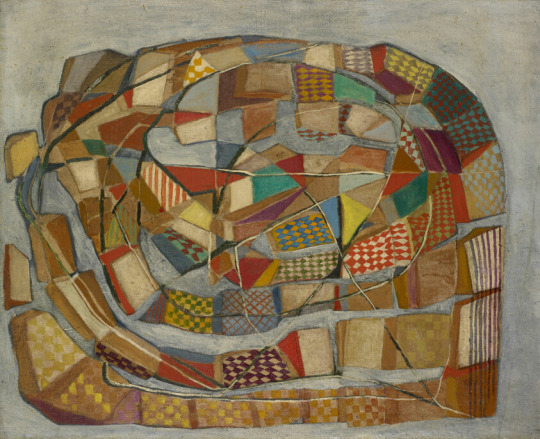
Composition, 1936-37, Maria Vieira da Silva (French, born Portugal, 1908-1992). Oil on canvas, 81.6 x 100.7 cm. The Art Institute of Chicago.
The many colorful patterns seen in Maria Helena Vieira da Silva’s abstract painting Composition derive from azulejo, decorative ceramic tilework common in Portugal and Spain, which the artist collected and admired. Despite finding her inspiration for abstract paintings in the material world, she described her compositions as evoking “a thought form rather than a realistic form.” Vieira da Silva insisted on the merits of abstraction even as the political situation in 1930s Europe seemed to demand artworks with a clear political message. She actively engaged in debates with the leftist intellectual group Amis du Monde on the political risks and merits of painting abstractly at this moment.
4 notes
·
View notes